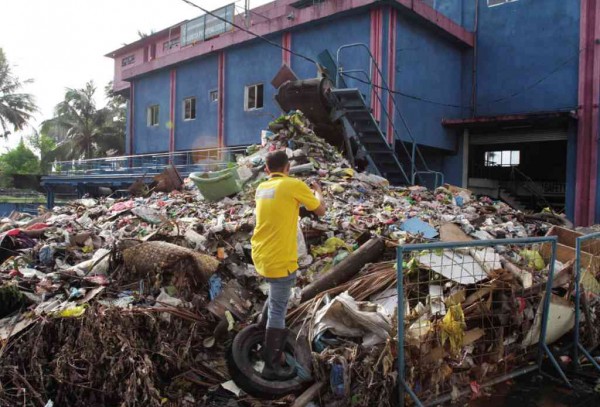
DOUBLE PURPOSE One of the 52 flood pumping stations operated by the MMDA, located at Sta. Mesa, Manila, ends up serving another purpose—as a “collector” of garbage from the waterways that could potentially damage its system. Photo taken in June. NIÑO JESUS ORBETA
Next to an efficient drainage system, they may be your next line of defense against flash floods in the metropolis.
There are currently 52 floodwater pumping stations operated by the Metropolitan Manila Development Authority, but Mandaluyong City Mayor Benhur Abalos said his constituents could use one more.
In a recent interview, Abalos asked the MMDA to build another station on “a main artery” of the city or at least in the Kalentong area, which he said had become flood-prone.
He said the existing pumping station installed during the term of then MMDA Chairman Bayani Fernando, which was placed in the Hulo area, had been “a big help” in keeping neighborhoods from going underwater.
Abalos recalled that when he visited neighboring San Juan City amid heavy monsoon rains last week, he didn’t see any flooded areas.
“It can be attributed to the new pumping station of San Juan,” he said, echoing an earlier statement by MMDA Chairman Francis Tolentino announcing the inauguration of the P139-million station on C. Leyva Street in Barangay (village) Balong Bato.
In earlier interviews, Tolentino noted that most of the pumping stations operated by the agency were already dilapidated since they were built back in the 1970s.
Last year, the failure of pumping stations in Taguig City was blamed for the floods that lasted in the city for weeks. The problem, however, was later traced to the delayed delivery of fuel for the pumps.
According to the MMDA, its 52 pumping stations are located as follows:
Makati City, 2 stations; Pasay, 2; Pasig, 3; Taguig, 3; San Juan, 1; Mandaluyong, 1; Quezon City, 2; Navotas, 1; Malabon, 16; and Manila, 21.
The number does not include pumps operated by the local government.
In a related development, Abalos said the P1-billion flood-control project being constructed by the Department of Public Works and Highways (DPWH) near Mandaluyong City Hall would likely be finished next year.
The project would act like a “big cistern” that would collect rainwater 30 feet underground and address recurrent flooding mainly in the Maysilo area.
Abalos also reiterated earlier calls for the DPWH to construct a bridge going to C5 Road from the Ortigas area.
The new bridge, he said, could serve as an alternative route for motorists whenever portions of Edsa go underwater.
“In Kalentong for example, when it’s flooded, you can use Bacood bridge instead. Like in Makati City, when it’s flooded in Rockwell, you can take Ayala Avenue,” Abalos said.
“Hopefully (the proposed bridge) would be included on the list of projects next year,” he said, adding that Public Works Secretary Rogelio Singson had been repeatedly informed about the suggestion.